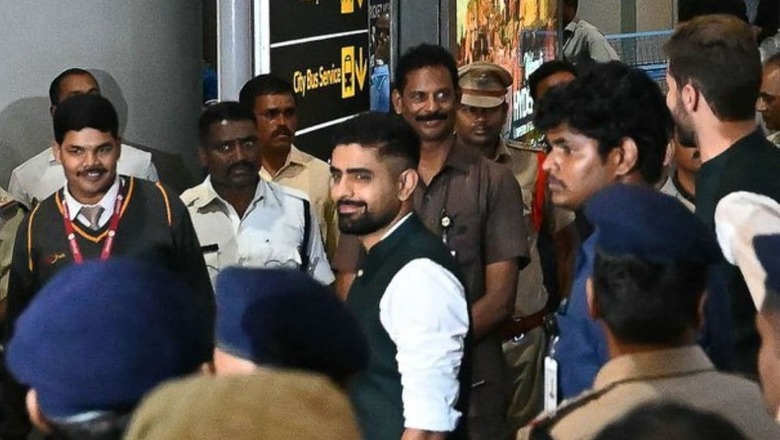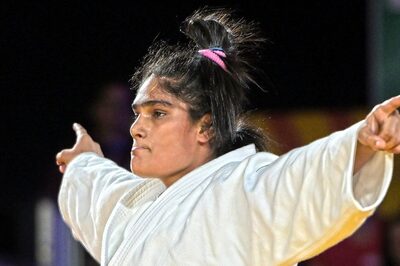
views
They are here. Pakistan’s one-day international cricket world cup team has arrived to notch up a “victory for Islam” against Rohit Sharma’s boys on Indian soil. Before someone says that it’s mighty irresponsible to drag religion onto the cricket field, let’s jog our collective memory back to 2021. Then some Pakistani politicians, cricketers and citizens had described their surprise victory over India in a T20 world cup match as a moment for all Muslims to “rejoice” at the “victory of Islam”.
Now, two years later, as they took their first steps in Hyderabad’s gleaming “first-world” airport, the Pakistan team, many say, was dazzled. India has, after all, left its truculent neighbour far behind in many walks of national life.
But as they were subjected to a mawkish display of Indian hospitality, one hopes that Babar Azam’s boys were not only overwhelmed by the generous welcome but also overcome by guilt.
Yes, guilt, because sadly, Pakistan’s cricketers have become the ambassadors of a baleful and intolerant Pakistani state.
While Indians – brought up to believe that an Atithi (guest) is no less than a Dev (God) – can’t help but shower hospitality upon the visiting Pakistani team, they must at least pause to think if the visitors have earned the goodwill.
Unlike Indian cricketers who are wholesomely cosmopolitan, Pakistan’s team has been forced to view the world from an intensely parochial prism. In the past, teams from across the border were fired by the purely secular call of patriotism. The desire to better arch-sporting rival India. But sadly, that’s no longer the case.
Cricket in Pakistan has been Islamized much like its civil society and other institutions, including its army.
Shamil Sams, who writes for a German media house, traces the blurring of lines between faith and cricket in Pakistan to the 1990s. That’s when, Sams says, many Pakistani players joined the Tablighi Jamaat (TJ), an Islamic missionary group.
Cleanshaven cricketers suddenly sported beards and skull caps, and began offering namaz on the field itself. Some, as Anil Dalpat, a former Hindu Pakistani national cricketer revealed, even forced minority players like him to convert. If they resisted, like Dalpat did, they were dropped.
Even “secular Muslim” Pakistani players weren’t spared. The dressing room was divided into “TJs” and “non-TJs”, and players could be sidelined or dropped if they held out against the pressure to join the evangelisers.
Yousuf Youhana (now Mohammad Yousuf), a former Pakistan captain, it is widely claimed, was forced to convert from Christianity to Islam by another iconic player who suddenly turned into a “TJ”.
After Pakistan’s shock exit in the 2007 world cup, its cricket media manager P. Mir, who prepared a report on why the team under-performed, told reporters, “Pakistani players were more enthusiastic about converting non-Muslims than playing cricket. Foreign journalists wanted to know why the Pakistani players were saying the azaan (call to prayer) in the aeroplane. I could not disclose this fact before. But I have now informed the PEC (Performance Evaluation Committee) that most players had no focus on cricket and their fixation was on preaching, which affected their preparations.”
No cricketer epitomises the embrace of religion more than Imran Khan. The British-educated “playboy” cricketer’s plunge into politics saw him renounce his secular-liberalism. Turning to religious conservatism, Imran quickly saw exponential growth in his political acceptability. Eventually, Imran became prime minister, riding on his love for religion, which he claimed was the only antidote to moral dissolution and corruption afflicting Pakistan.
Shamil Sams observes that “Many cricketers now use religious terminology in their press conferences, and some even prostrate on the field after a victory.”
Waqar Younis, iconic fast bowler turned commentator, was so overjoyed when apart from winning against India, “The best thing, what (Mohammad) Rizwan did, Mashallah, he offered the namaz on the ground surrounded by Hindus, that was really something very-very special for me.”
Even those superficially acquainted with the socio-political situation in Pakistan would not be shocked by this demonstration of religious exclusivism. Waqar and other Pakistani players are only mirroring Pakistan’s broader national character.
Years of misgovernance have meant that Pakistan’s ruling class has lost its legitimacy. In the absence of anything to show for their time in office, politicians have turned to distracting the public by pushing the opiate of religious and ethnic exclusivism. Pakistan’s politicians see an “outsider” behind every failing. Balochis, Hazaras, Ahmadis, Pakistani Hindus, Sikhs and Christians, and of course, Indians, particularly Hindu Indians, are among those routinely villainised.
It is then only to be expected that many Pakistanis, including cricketers, will increasingly think nothing of vengefully chalking up every victory against the Indian team as a “victory for Islam”.
The Indian public that is today queuing up to watch India take on Pakistan on our own soil must remember that it is incentivising (or even financing) an intolerant outlook, not to forget cross-border terrorism.
It is naive to think that Indian cricket fans are investing in “crick-plomacy” in the hope that the resumption of sporting ties will encourage leaders on both sides to hold a more substantive peace dialogue. While Indians eternally harbour an “aman ki asha”, let’s not forget a fact of history: a sport has only ever become more than just a game where the contesting parties share a common moral and philosophical ethos.




















Comments
0 comment